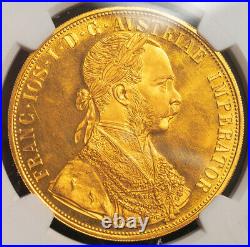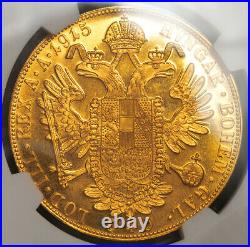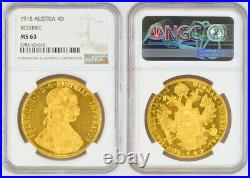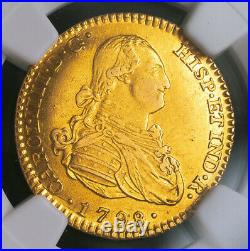
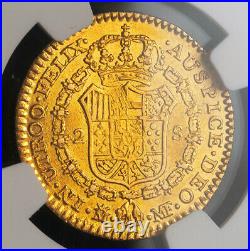
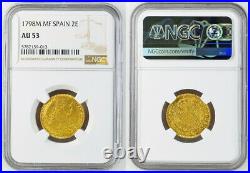

1798, Spain, Charles IV. Spanish Gold 2 Escudos Coin. (6.77gm) NGC AU-53! Mint Year: 1798 Denomination: 2 Escudos Reference: Friedberg 296, KM-435.1. Mint Place: Madrid (privy mark: crowned M) Condition. Minor deposits in protected areas, otherwise a nice XF! 875 Diameter: 22mm Weight: 6.77gm. Obverse: Draped profile bust of Charles IV right. Charles IV by the Grace of God, King of the Spains and Indies 1798. Reverse: Shield under crown within Golden Fleece Order collar. Value (2-S) in fields. Legend: AUSPICE DEO IN UTROQ FELIX (privy mark: crowned M) MF (assayer initials) Translateion. Under God’s Auspices Happy in Both (Worlds). The doubloon (from Spanish doblon, meaning “double”), was a two-escudo or 32-reales gold coin, weighing 6.77 grams (0.218 troy ounces). Doubloons were minted in Spain, Mexico, Peru, and Nueva Granada. In Spain, doubloons were current up to the middle of the 19th century. In Europe the doubloon became the model for several other gold coins, including the French Louis d’or, the Italian doppia, the Swiss duplone, the Northern German pistole, and the Prussian Friedrich d’or. Was King of Spain from. Until his abdication on. Charles was the second son of Charles III and his wife Maria Amalia of Saxony. He was born at Portici, while his father was king of the Two Sicilies. His elder brother Don Felipe was passed over for the two thrones as mentally retarded and epileptic. Charles had inherited a great frame and immense physical strength from the Saxon line of his mother, granddaughter of August the Strong. When young he was fond of wrestling with the strongest countrymen he could find. While he was considered by many to be intellectually sluggish and quite credulous he was also known for his acts of kindness. In 1788, Charles III died and Charles IV succeeded to the throne. Even though he had a profound belief in the sanctity of his office and kept up the appearance of an absolute, powerful monarch, he never took more than a passive part in the direction of his own government, occupying himself with hunting. The affairs of government he left to his wife and his prime minister. In 1792, Maria Louis finally succeeded in ousting the Count of Floridablanca from office and had him replaced with Pedro Pablo Abarca de Bolea, Count of Aranda, the chief of the. However, in the wake of the war against Republican France, the liberal-leaning Count of Aranda was replaced by Manuel de Godoy, a favourite of the Queen and allegedly her lover, who would henceforth enjoy the lasting favour of the King. Godoy continued Aranda’s policy of neutrality towards France but after Spain protested against the execution of the deposed king in 1793, France declared war on Spain and in 1795 forced Godoy to conclude an alliance and declared war on Great Britain. In 1803, after smallpox had affected his daughter Maria Luisa, the king commissioned his doctor Francisco Javier de Balmis to bring the vaccine to the Spanish colonies on state expenses. Spain remained an ally of France and supported the Continental Blockade until the the British naval victory at Trafalgar. However, After Napoleon’s victory over Prussia in 1807, Godoy again steered Spain back onto the French side. This switching back and forth devalued Charles’ position as a trustworthy ally while the return to the French alliance increased Godoy’s unpopularity and strengthened. The supporters of Crown Prince Ferdinand, who favored a close relationship with Great Britain. When King Charles was told that his son Ferdinand was appealing to Napoleon against Godoy, he took the side of the minister. When the populace rose at Aranjuez in 1808 he abdicated on. In favour of his son, to save the minister who had been taken prisoner. Ferdinand took the throne as Ferdinand VII, but was distrusted by Napoleon who had 100,000 soldiers in Spain by that time. Charles IV found refuge in France, and became a prisoner of Napoleon: the latter, posing as arbiter, summoned both Charles IV and his son to Bayonne in April and coaxed Charles (who had a difficult time restraining himself from assaulting his son) to retract his earlier abdication and abdicate, on. In favour of Napoleon. Charles was then interned in Talleyrand’s castle in Valençay. He accepted a pension from the French Emperor and spent the rest of his life between his wife and Godoy, staying briefly in Compiègne and more durably in Marseille. In 1812, he finally settled in Rome in the Palazzo Barberini, where he died on. The item “1798, Spain, Charles IV. Spanish Gold 2 Escudos Coin. (6.77gm) NGC AU-53″ is in sale since Monday, August 30, 2021. This item is in the category “Coins & Paper Money\Coins\ World\Europe\Spain”. The seller is “coinworldtv” and is located in Wien. This item can be shipped worldwide.
- Composition: Gold
- Country/Region of Manufacture: Spain
- Certification: NGC
- Denomination: 2 Escudos
- KM Number: 435.1.
- Grade: AU 53
- Year: 1798


